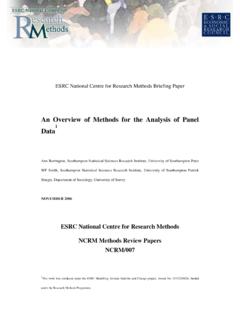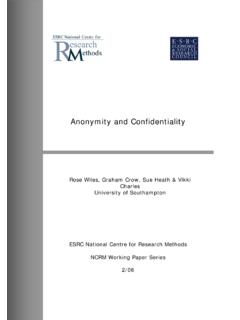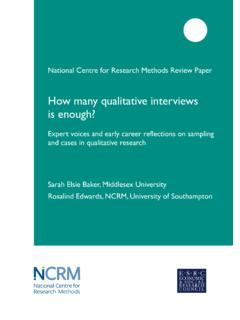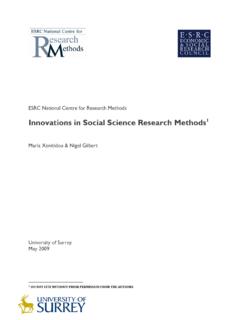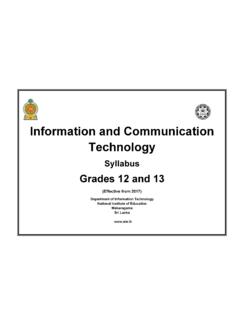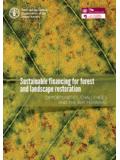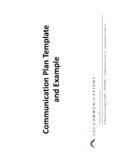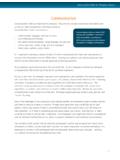Transcription of Conducting qualitative research with people with learning ...
1 1 ESRC National Centre for research Methods Review Paper Conducting qualitative research with people with learning , communication and other disabilities: Methodological challenges Melanie Nind University of Southampton November 2008 National Centre for research Methods NCRM/012 2 Abstract 3 1. Introduction 4 2. research Design: research for, with or on? 4 3. Developing ethics protocols 5 The research relationship 6 Informed consent 6 Anonymity 8 Power of redress 8 Steering or advisory groups 9 4.
2 Collecting data: methods and approaches 9 Gaining access 9 Communicating 9 Interview 10 Focus Groups 11 Questionnaire and survey 12 Visual methods 13 Life story/Narrative 13 Ethnography/Observation 14 Other methods 14 5. Analysing data 15 6. Sharing the findings 15 7. Conclusion 16 References 17 Appendix 1: Guidance on making information accessible 22 Appendix 2: Augmentative and alternative communication 23 Appendix 3: Examples of Accessible research Reports 24 3 Abstract This methodological paper reviews the research literature and discusses the issues that arise in Conducting qualitative research with people for whom traditional methods of qualitative research might present challenges for researchers.
3 The focus is on children and adults with learning difficulties, communication difficulties or other disabilities such as autism with associated complex challenges in communicating, understanding and taking part in qualitative research . The paper s structure follows the stages of Conducting research and includes design, ethics, data collection, analysis and reporting. Both methodological challenges in common with researching other groups (including other so-called vulnerable groups, minority groups and hard to reach groups as well as mainstream participants) and those unique to research with this disabled group are addressed, culminating in guidance for researchers on methods, approaches and key issues.
4 Recurrent themes include: techniques for communicating abstract ideas to participants, enabling participants to express their views and tell of their experiences, ways of acting responsibly and ways of acting inclusively. The review illuminates some of developments in what can be achieved in research with people with learning and communication difficulties and some of limitations in what has been managed to date. The review was commissioned by NCRM in 2008. 41. Introduction This paper draws on a considerable quantity of literature identified both through systematic searching (using search terms to identify learning / communication difficulties, qualitative / participatory/emancipatory research , or specific techniques such as interview/focus group/narrative) in conjunction with hand-searching particular journals.
5 British Journal of learning Disabilities and Disability and Society proved key sources for both methodological papers and reports of studies that had addressed methodological challenges in interesting ways. In this way the review incorporates not just discursive literature about methodology but substantive literature describing the use of various methods. It does not have the transparency, replicability and claim to comprehensiveness of a systematic review; instead the emphasis is on providing an informed synthesis of the literature for practical purposes. In terms of scope the review is limited to papers published in the English language with the majority being published in the UK.
6 The history of qualitative research with people with learning / communication difficulties is relatively short and some of the early, seminal literature is included alongside very recent papers. The bulk of the literature concerns people with learning difficulties (many of whom also have communication difficulties). This reflects in part, where most of the material can be found, in part my own expertise, and in part a working premise that the specific nature of the impairment is often not of central importance. Like Gilbert (2004), I was able to find less literature on research with people with higher support needs.
7 Indeed, the literature rarely addresses researching people with profound and multiple learning difficulties as qualitative research with this group is particularly rare and difficult. with regard to terminology, learning difficulties and learning disabilities are both used to reflect the choice of term used by various authors. This is likely to reflect subtle contextual nuances ( difficulties is used more in education and disabilities more in health) or authors preferences, but it does not distinguish differences in the participants themselves. The review is based on some basic premises: the difficulties experienced by people with learning difficulties, communication difficulties, autistic spectrum disorders etc will be subtly different, but none of these groups are homogeneous and the impairment does not define the individual and their experience.
8 The challenges faced by qualitative researchers doing research with this group, like the challenges faced by the disabled individuals themselves, are as much as a product of the interactions between them and the wider context as of any inherent impairment; people with learning / communication difficulties have something to say that is worth hearing and experiences that are worth understanding, making it important to commit serious attention to the methodological challenges involved in researching them. The review is primarily about providing a synthesis of the issues, the challenges and the ways these have been addressed.
9 The goal is to take stock and to gather together methodological guidance to inform the continued development of qualitative research methods. This process begins with the values underpinning qualitative research with people with learning difficulties and how these determine how we think about our fundamental research approach. 2. research Design: research for, with or on? Kiernan (1999, ) very helpfully captures the political nature of qualitative research with people with learning difficulties: The goal of qualitative research is quite explicitly to ground studies in the experience and views of respondents.
10 Nonetheless, even in qualitative studies, it is the researcher (or, in externally funded research , the funding body) who determines the overall research questions, and the researcher who gathers, analyses and interprets the data and draws conclusions. Thus, it is evident that while seeking to value the experiences of people with learning difficulties, traditional qualitative research is likely to encompass substantial barriers between the powerful researcher and the less powerful researched. While particular methods might be adopted to address these barriers, their existence has been challenged more fundamentally.
